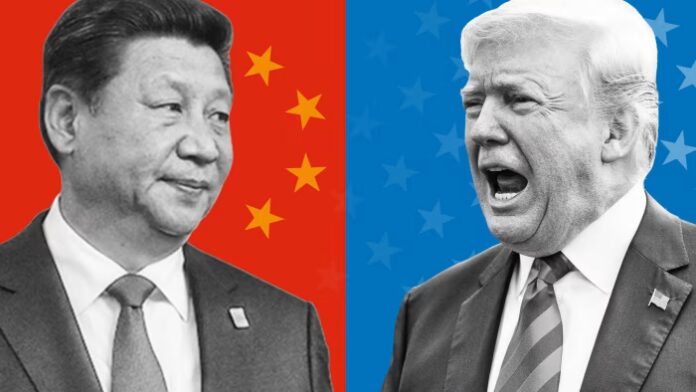Unlock the White House Watch newsletter for free
Your guide to what Trump’s second term means for Washington, business and the world
Donald Trump’s least appreciated quality is his lack of martial instincts towards China. This puts him in a minority in Washington DC, including in his own administration. Whatever Trump’s faults, toying with a third world war is not among them. The same does not apply to his approach to trade, where he embraces perpetual warfare. If he could extend his grasp of mutual assured destruction to trade, he might be on a better path.
As I wrote recently, Trump is a gift that keeps on giving to China, and his latest trade brinkmanship is likely to end in another climbdown. But we should not forget how frequently non-Maga Washington has misread Beijing. When China joined the World Trade Organization in 2001, the consensus was that it would inevitably liberalise as it climbed the value-added chain. The more China’s economy shifted to services, the more it would need democracy to enable its creative classes.
This proved 100 per cent wrong. China under Jiang Zemin at the start of this century was far less unfree than it is today under Xi Jinping. Yet its economy is more than 15 times larger today. The second Washington mistake as the aughts progressed was to assume that China could not innovate. This was an offshoot of the first error. Since China was autocratic, the reasoning went, the free spirit of commercial research and experimentation would be lacking. The most China could do would be to rip off western companies by leveraging its vast market to coerce them into transferring technology.
This, indeed, is how it unfolded. But in the process China remembered how to innovate. The west was also myopic. Dynastic China invented printing, the compass, porcelain, gunpowder and papermaking. Today’s China is ahead of the rest on many technologies, including renewable energy, drones, hypersonic weapons and batteries. The link between free societies and innovation is strong, but not the whole story.
The third mistake, and potentially the worst, is to assume that China is in a zero-sum struggle with America to run the world. A self-possessed America would know that a “Pax Sinica” is improbable. Even if China sought to remake the world in its image — and the evidence for that should be debated more — Beijing lacks the alliances that would make it happen. Pax Americana has been built on America’s unparalleled web of global allies and bases. China plays enabler to Russia’s war in Ukraine but is formally allied only to North Korea.
China hawks point out that Beijing would have no need of allies were it to win the race to artificial general intelligence. Global domination would fall into its lap. Getting first to superintelligence would give China the means to overwhelm a human-run US military — and everyone else’s. This, indeed, is an argument that Silicon Valley has milked to the max. But it is based on an almost comic-book idea of the technological endgame that is disputed by many AI experts.
Trump does not seem to share the view that the US and China are locked in a Manichean contest for global supremacy. Doubtless, he would embrace that consensus tomorrow if he saw an upside. Yet his actions are nevertheless feeding China’s ambitions and making it likelier the two powers will at some point collide.
Trump is fated, for example, to keep coming out worse from his trade escalations with China. At bottom, China has more leverage than America. The US can shut off high-end chip and AI processor exports and the machinery to make them. That is what Joe Biden tried. China, meanwhile, can close down all access to its rare earths.
Though still lagging behind America, China has shown that it can innovate rapidly on semiconductors and other dual-use technologies. The US, by contrast, has had 15 years to make up for its lack of rare earths and processing capabilities and has done almost nothing to fix it. China’s ability to damage the US economy is more potent for the time being than vice versa. Which means Trump is again likely to blink first.
Why are Republican hawks so muted in their criticisms of Trump on China? Only partly because of fear. Mostly it is because he is giving them what they want on AI. Trump has done away with the few guardrails that existed. In Silicon Valley they extol AI’s many benefits to humankind. Their Washington lobbyists chiefly cite the race with China.
Either way, Trump’s administration is a field day for Palantir, OpenAI, xAI, Anduril and others. Trump may think he is the ultimate peacemaker. But his actions are stoking China’s self-belief and elevating America’s military-AI complex. It would be eccentric to assume he knows what he is doing.
Source link





